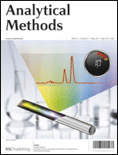
Analytical Methods
Scope & Guideline
Innovating Methodologies for a Brighter Tomorrow
Introduction
Aims and Scopes
- Chemical Analysis Techniques:
The journal publishes research on various chemical analysis methods, including chromatography, mass spectrometry, and electrochemical techniques, highlighting advancements that improve detection limits and speed. - Biosensing Applications:
It features studies on biosensors for detecting biological markers, pathogens, and toxins, often integrating nanomaterials to enhance sensitivity and specificity. - Environmental Monitoring:
Research on methods for the detection and quantification of pollutants in environmental samples is a significant focus, particularly regarding water quality and food safety. - Nanotechnology and Materials Science:
The journal explores the use of nanomaterials in analytical chemistry, including their role in enhancing sensor performance and developing new detection methodologies. - Point-of-Care Testing Innovations:
There is a consistent emphasis on developing portable, easy-to-use analytical devices for rapid testing in clinical, environmental, and food safety contexts.
Trending and Emerging
- CRISPR-Based Detection Methods:
The integration of CRISPR technology into various biosensing platforms has gained momentum, enabling highly sensitive and specific detection of nucleic acids and proteins, marking a significant advancement in diagnostic methodologies. - Nanomaterial-Enhanced Sensors:
The use of nanomaterials, such as carbon dots and metal-organic frameworks, is increasingly prevalent in sensor development, enhancing sensitivity and selectivity for various analytes across different applications. - Machine Learning in Analytical Chemistry:
There is an emerging trend towards incorporating machine learning algorithms in data analysis and interpretation, improving the accuracy and efficiency of analytical processes, particularly in complex datasets. - Eco-Friendly Analytical Techniques:
Research focusing on sustainable and green chemistry practices, including the development of environmentally friendly solvents and methods, is on the rise, reflecting a broader awareness of ecological impacts. - Portable and On-Site Analytical Devices:
The trend towards developing portable analytical devices for on-site testing is gaining traction, particularly in fields like environmental monitoring and point-of-care diagnostics, emphasizing rapid and accessible testing.
Declining or Waning
- Traditional Spectroscopy Techniques:
Though still relevant, the publication frequency of conventional methods like UV-Vis and IR spectroscopy has decreased as researchers increasingly adopt more sensitive and specific techniques such as SERS and fluorescence-based methods. - Historical Analytical Methods:
Research centered on classical methods of analysis, such as gravimetric and titrimetric techniques, has become less common, reflecting a shift towards more modern and efficient approaches. - Manual Sample Preparation Methods:
There is a noticeable decline in studies focusing on labor-intensive manual sample preparation techniques as automated and miniaturized methods become more prevalent, improving efficiency and reproducibility. - Basic Chemical Reactions in Analysis:
Research that primarily discusses fundamental chemical reactions without integration into novel methodologies or applications has waned, as the journal emphasizes innovative approaches.
Similar Journals

Journal of Analysis and Testing
Advancing analytical excellence for a sustainable future.Journal of Analysis and Testing is a premier academic journal published by SPRINGER SINGAPORE PTE LTD, dedicated to advancing the fields of analytical and environmental chemistry. With ISSN 2096-241X and E-ISSN 2509-4696, the journal has established a significant presence since its inception in 2017, converging its focus until 2024. The journal's outstanding rankings in 2023, including Q1 quartile placements in Analytical Chemistry, Instrumentation, and Spectroscopy, underscore its pivotal role in disseminating high-quality research. Researchers can access cutting-edge studies that explore innovative testing methodologies, electrochemical analyses, and material evaluations, making it an essential resource for professionals and students alike. The Journal of Analysis and Testing not only celebrates advances in science and technology but also promotes interdisciplinary collaborations, ensuring widespread impact across analytical and environmental domains. As such, this journal plays a vital role in shaping the future of analytical practices and methodologies, positioning itself as a key conduit for knowledge exchange in the scholarly community.
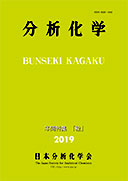
BUNSEKI KAGAKU
Connecting Researchers Through Quality ScholarshipBUNSEKI KAGAKU, published by the Japan Society Analytical Chemistry, is a reputable journal dedicated to the field of analytical chemistry. With an ISSN of 0525-1931, this journal has been a crucial outlet for scholarly communication since its inception in 1952, converging its publication years from 1954 to 1957 and from 1959 to 2024. Although it holds a Q4 category ranking in the most recent 2023 quartiles of analytical chemistry and ranks 153/156 in Scopus, it continues to serve as a platform for quality research, fostering advancements in the field. BUNSEKI KAGAKU is based in Tokyo, Japan, and emphasizes the critical importance of analytical techniques in scientific inquiry. With a commitment to professionalism and rigor, the journal provides a vital resource for researchers, students, and professionals seeking to explore innovative methodologies and contribute to the ongoing dialogue in analytical chemistry.

Separation Science Plus
Advancing analytical horizons in separation science.Separation Science Plus is an emerging academic journal dedicated to advancing the field of analytical chemistry and separation science. Published by WILEY-VCH Verlag GmbH, this journal provides a platform for researchers to disseminate high-quality studies and reviews that address innovative techniques and breakthroughs in separation methodologies. With its ISSN 2573-1815, the journal has made significant inroads since its inception in 2018, encompassing a convergence period until 2024. Despite currently holding a Q3 ranking in Analytical Chemistry and a Q4 ranking in Filtration and Separation, its dedication to publishing impactful research makes it a vital resource for professionals and students alike. The journal operates under the robust scholarly reputation of WILEY, which is known for its commitment to excellence in scientific communication. Researchers interested in the latest advancements in separation techniques will find Separation Science Plus an essential read, fostering the exchange of knowledge and facilitating greater understanding within this specialized field.

Talanta Open
Championing Quality and Accessibility in ScienceTalanta Open (ISSN: 2666-8319) is a prominent open-access journal published by Elsevier, dedicated to advancing the field of Analytical Chemistry. Established in 2020, the journal aims to foster innovative research and facilitate knowledge sharing in the analysis of chemical substances and their interactions. With an impressive Q2 ranking in the Analytical Chemistry category and a commendable Scopus ranking of #57/156, Talanta Open has quickly established itself as a vital resource for researchers, professionals, and students alike. The journal is known for its rigorous peer-review process and commitment to quality, ensuring that published content significantly contributes to the scientific community. By providing unrestricted access to high-quality research, Talanta Open underscores the importance of collaboration and accessibility in the ever-evolving landscape of analytical science.

SENSORS
Illuminating the path of sensor technology evolution.SENSORS is a leading peer-reviewed open-access journal published by MDPI, dedicated to the field of sensor technology and its applications. Established in 2001 and located in Basel, Switzerland, this journal plays a pivotal role in disseminating groundbreaking research encompassing various disciplines, including Analytical Chemistry, Physics, Engineering, and Biochemistry. With a distinguished 2023 Scopus ranking that places it in Q1 across multiple categories and a commendable impact factor reflective of its high-quality contributions, SENSORS has cemented its status as an essential resource for researchers and professionals alike. The journal is committed to facilitating knowledge exchange in cutting-edge sensor technologies, fostering advancement in areas such as instrumentation, medical applications, and electronic engineering. The convenient open-access model ensures that research findings are readily accessible to a global audience, promoting collaboration and innovation within the scientific community. For all those interested in probing the depths of this dynamic field, SENSORS provides a rich repository of research that not only informs but inspires future explorations.
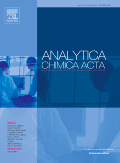
Analytica Chimica Acta
Empowering discoveries through innovative research.Analytica Chimica Acta is a prestigious peer-reviewed journal published by ELSEVIER, renowned for its significant contribution to the fields of analytical chemistry, biochemistry, environmental chemistry, and spectroscopy. Established in 1947, this journal has solidified its reputation, reflected in its impressive impact factors and Scopus rankings, including a Q1 classification in Analytical Chemistry and Spectroscopy, and a Q2 ranking in both Biochemistry and Environmental Chemistry. With its comprehensive scope, Analytica Chimica Acta aims to publish innovative research, critical reviews, and technical notes that advance the understanding and application of analytical methods. As an essential resource for researchers, professionals, and students alike, it encourages the dissemination of high-quality research that addresses contemporary challenges in chemical analysis and promotes interdisciplinary collaboration. While the journal operates primarily on a subscription basis, it also offers unique opportunities for authors to reach a broad audience and engage in the global scientific discourse.
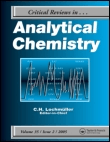
CRITICAL REVIEWS IN ANALYTICAL CHEMISTRY
Transforming Discoveries into Comprehensive Reviews.Critical Reviews in Analytical Chemistry, published by Taylor & Francis Inc, stands as a pivotal journal in the field of analytical chemistry, contributing significantly to its advancement since its inception in 1989. With an impressive Q1 ranking in the 2023 analytical chemistry category, it positions itself among the top 15 journals in the field, reflecting its high impact and relevance, as evidenced by a 90th percentile Scopus rank. This esteemed journal is dedicated to publishing comprehensive reviews that synthesize current research and emerging methods in analytical techniques, making it an invaluable resource for researchers, professionals, and students alike. With the goal of fostering innovation and collaboration, Critical Reviews in Analytical Chemistry continues to address challenges and breakthroughs within the sphere of analytical methodologies, ensuring its authors and readers remain at the forefront of scientific discovery.
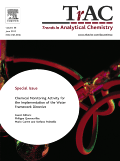
TRAC-TRENDS IN ANALYTICAL CHEMISTRY
Fostering Cross-Disciplinary Dialogue in Analytical ScienceTRAC - Trends in Analytical Chemistry is a prestigious journal published by Elsevier Science Ltd, situated in the Netherlands. With an impressive impact factor reflected in its Q1 rankings across three major categories—Analytical Chemistry, Environmental Chemistry, and Spectroscopy—this journal stands at the forefront of disseminating pioneering research and advancements in the field of analytical chemistry. Established in 1981, TRAC provides a comprehensive platform for researchers to share influential studies and insights related to the latest trends, methodologies, and technologies in analytical techniques. Recognized globally, the journal excels in fostering cross-disciplinary dialogue and innovation, making it an indispensable resource for academics, professionals, and students alike. Explore the latest issues to stay abreast of cutting-edge developments that shape the analytical sciences.
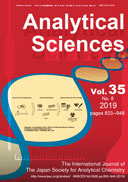
ANALYTICAL SCIENCES
Exploring the Depths of Analytical ExcellenceANALYTICAL SCIENCES, published by SPRINGERNATURE, is a prestigious journal established in 1985 dedicated to advancing the field of analytical chemistry. With an ISSN of 0910-6340 and an E-ISSN of 1348-2246, this journal plays a critical role in disseminating high-quality research and innovative methodologies. Operating from Switzerland, it aims to provide a platform for scholars, researchers, and professionals to explore significant developments and applications in analytical techniques. Although classified in the third quartile (Q3) of analytical chemistry, which places it in a competitive framework (Rank #96/156, 38th Percentile in Scopus), its impact on the discipline is noteworthy. While it is not currently an open-access journal, the resources within are invaluable for those seeking to stay at the forefront of research and practice in analytical sciences, making it an essential read for anyone involved in this dynamic field. The journal continues to converge critical insights from 1985 to 2024, fostering a community dedicated to innovation and excellence in analytical chemistry.

JOURNAL OF ANALYTICAL CHEMISTRY
Driving Innovation in Analytical ResearchJOURNAL OF ANALYTICAL CHEMISTRY, published by PLEIADES PUBLISHING INC, stands as a pivotal resource in the field of analytical chemistry, offering an innovative platform for researchers, professionals, and students to advance their knowledge and contribute to the discourse within the discipline. With an ISSN of 1061-9348 and an E-ISSN of 1608-3199, this journal features a focused exploration of analytical methodologies, instrumentation developments, and applications across various domains, contributing to practical and theoretical advancements in the field. Currently ranked in the Q3 category in Analytical Chemistry with a Scopus rank of #111 out of 156, it provides critical insights and innovation strategies for professionals aiming to enhance their analytical capabilities. Access to the journal is through standard subscription models, and it covers an extensive range of topics pertinent to the discipline from 1996 to 2024. Engage with the JOURNAL OF ANALYTICAL CHEMISTRY to be part of a vibrant research community dedicated to push the boundaries of analytical practices.